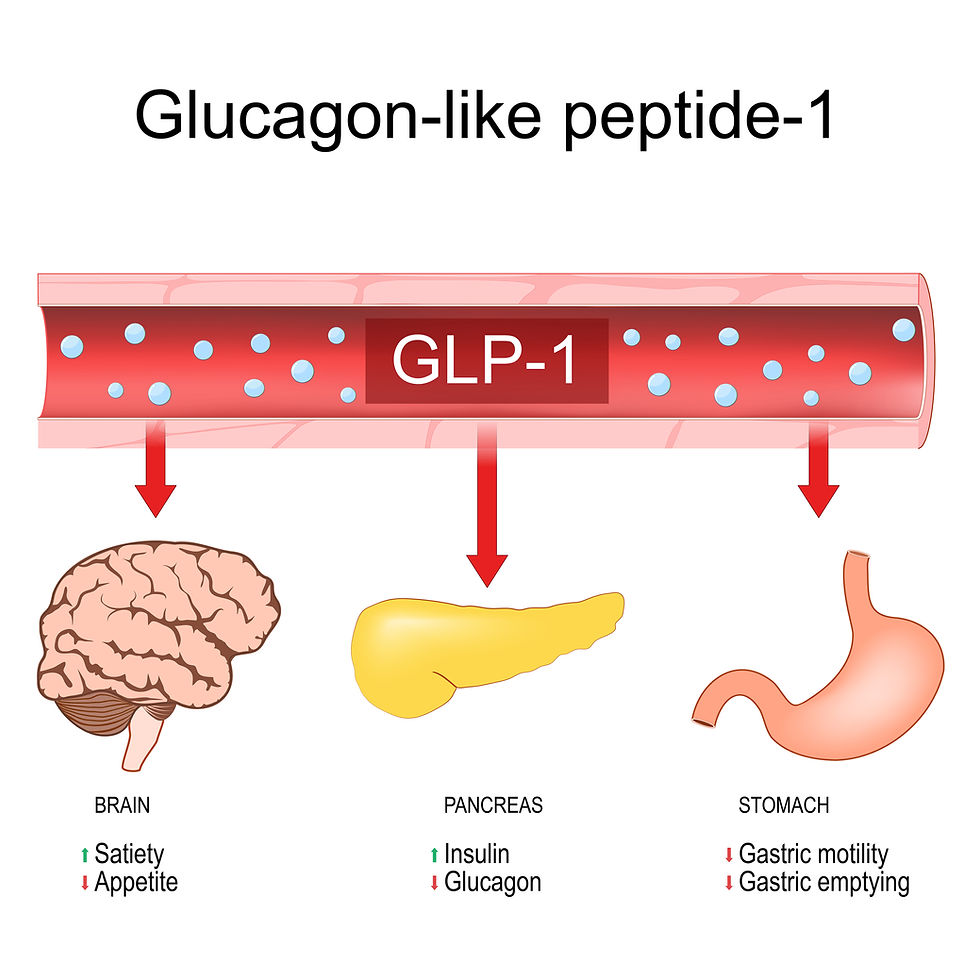Considering GLP-1 Medications? Beyond the Prescription: Building Health that lasts.
- Julie Hodgson
- Sep 17, 2025
- 5 min read

If you’re considering starting a GLP-1 medication, most commonly semaglutide ( Wegovy, Ozempic and Rybelsus) for weight loss or blood-sugar control, you should have the full picture.
My goal here is just to share my views and what I’ve learned from my research and helping clients, so that you can weigh the evidence and make the choice that feels right for you.
I know that weight loss and health can feel incredibly emotional. It’s not just about numbers on a scale, it’s about wanting to feel more confident, more energetic, and free in your own body. When we’re hurting or frustrated, it’s only natural to look for relief as quickly as possible, and sometimes that means going to extraordinary lengths to feel better. Please know, if you’ve ever tried the latest diet, bought a supplement that promised the world, or considered medication without all the information, you are not alone. These choices come from a very human place, the deep desire to feel well again. My role is to help you find approaches that not only support you right now, but also build the strength, stability, and confidence that lasts.
What I have found - Benefits & Mechanisms
GLP-1 drugs mimic a hormone known as incretin hormones, released in your gut after a meal to regulate blood glucose and insulin. It also slows digestion, increases feelings of fullness, lowers appetite, and improves insulin response.
Clinical trials show significant weight loss (often 10-20% + of body weight) and improvements in metabolic markers (blood sugar, HBA1C, sometimes even heart disease risk).
My biggest worry is that the weight loss is not purely fat. Studies suggest a substantial portion of what's lost is fat-free mass (including muscle and bone). Approximately 25% to 40% of this weight loss comes from fat-free mass loss. (Liu et al., 2025).
Potentially, without the right support, coming off the drugs may be a problem with weight gain coming back and then some, due to the change in body composition towards higher fat and lower muscle mass.
My thoughts - We really don’t want to be losing excess muscle or bone as we age. Both are critical for maintaining a healthy weight, mobility, independence, and overall health later in life. Muscle can be hard enough to keep hold of as we age, and what about women in peri - and post-menopause, or the elderly, where bone loss can accelerate.
Incidentally, postmenopausal women already have about a 50% chance of sustaining a fracture related to osteoporosis in their lifetime. Views are mixed on whether GLP-1s will contribute to this risk, but the truth is, there is no long-term data to show either way. And the hard truth is that the majority of people are not exercising sufficiently to maintain either muscle or bone before taking GLP-1 medication. Purely my views. I help clients mitigate this risk through nutrition, lifestyle and exercise.
Side Effects
Like all medications, these drugs come with potential side effects. Some are mild and temporary, while others are more serious and have drawn attention from regulators and the media. My goal here isn’t to alarm you, but to share what has been reported so that you can make a fully informed choice. Ideally, with the right support around you.
Earlier versions of GLP-1 type medications have been withdrawn in different countries due to safety concerns. Today’s widely used drugs remain approved, but I think history highlights why regulators keep a close watch and why patients benefit from ongoing monitoring.
Most commonly, people experience gastrointestinal side effects such as nausea, constipation, or slower digestion, which may affect 1-10 patients. Regulatory agencies have also highlighted possible risks like gallbladder disease, kidney issues, dehydration, hypoglycaemia, low blood sugar, and more severe digestive issues.
There are also reports of people obtaining GLP-1 drugs from unregulated internet sources. These products may be contaminated or contain ingredients that aren’t what the label claims. Making them less effective and also raising serious safety risks.
The UK’s Medicines and Healthcare products Regulatory Agency (MHRA) confirms 82 deaths linked to GLP-1 medications as of January 31, 2025. More recent reporting has mentioned 111 fatal adverse reaction cases. In the U.S, the FDA’s reporting system has also logged hundreds of fatality reports since 2018. Some media outlets cite figures such as 780 deaths. These figures are not from official publications, however. Many people taking GLP-1s have other health conditions, and reports naturally rise as more people use these drugs.
Acute pancreatitis (inflammation of the pancreas) is one of the more serious risks under review. The MHRA has received hundreds of reports of people taking GLP-1s. While some media reports suggest as many as “1 in 100” users could be affected, this figure has not been confirmed in rigorous long-term studies.
Risk versus benefit
Here’s how I look at risk versus benefit through a functional nutrition and lifestyle lens. Your existing health status matters. If you already have concerns with your pancreas, kidneys, gallbladder, thyroid, or are older, risks may be higher. The pace of weight loss also seems important, since rapid weight loss can increase strain on the gallbladder, liver, and kidneys, as well as raise the chance of dehydration.
Building in lifestyle support, such as a protein-rich, nutrient-dense diet, resistance training, hydration, and gut health strategies, is protective. The medication can’t do this part for you. I would also think about the duration of use - Are you considering GLP-1s as a short-term bridge while you establish healthier habits, or something longer-term?
Finally, regular health reviews are essential, including blood work and symptom tracking, and information about other medications you take or health conditions you have or develop to keep you safe and supported.
My Take;
GLP-1 meds can open up opportunities, reduce appetite, lower blood sugar, and allow weight loss that’s hard to achieve otherwise. For many people, those benefits translate into better energy, less insulin dependence, and less risk of complications from obesity. However, these are all things you can achieve with the right diet and lifestyle support in many cases.
There is a non-trivial list of serious adverse events reported in real world settings, including deaths, pancreatitis, and other concerns. “Some data is preliminary; some is media-amplified; some is regulatory”.
The risk isn’t zero. I don't see much information about “How I protect myself whilst taking these drugs.” How can I support my long-term health? Is there just as much emphasis, support and information put on diet and lifestyle strategies? A ten-minute appointment with your GP doesn’t give you this information.
And I don't think people are made aware of the change in body composition from taking GLP-1 medication towards higher fat and lower muscle mass, and the implications of this long-term.
Unfortunately, so much emphasis these days is put on pharmaceuticals. Our whole healthcare model is pretty much pharmaceutical-based. It’s how the system is funded, run, and measured. That means meds are usually the first thing offered, while the things that actually build health, food, movement, sleep, stress support, are often pushed to the side.
It sets people up to look for quick fixes rather than digging into the root causes of what’s going on, and it leaves very little investment in prevention or lifestyle change. Medications can absolutely have a place, but they shouldn’t be the foundation of health. True, lasting health is built on habits and daily choices, with medication as a support - not the whole picture.
Believe it or not, I’m not anti-medication. I’m just massively PRO diet and lifestyle, and wish the same emphasis, support and research were put on this instead of pharmaceuticals. My passion is helping people build those habits so that, whether they choose medication or not, they’re set up for sustainable energy, strength, resilience and independence as they age.
If you have any questions, please do get in touch!
I help busy adults 35+ struggling with low energy, brain fog, stress, chronic health issues, and weight gain.”
I would love to hear from you.
Julie x
Helping you live a healthier, happier life





Comments